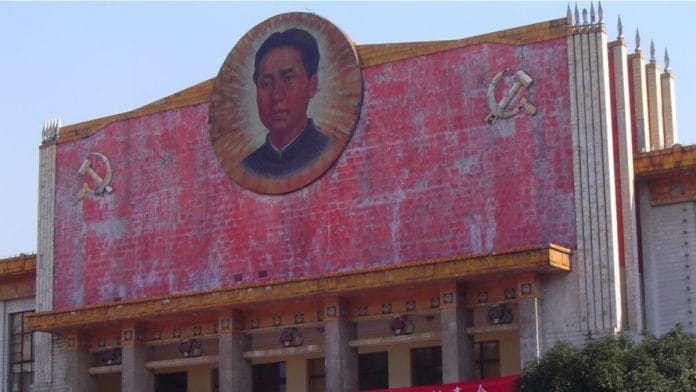The war of words between China and the United States over tariffs and trade took a sharp turn on 11 April, as Beijing launched a fierce social media offensive targeting the White House. By invoking Mao Zedong’s wartime rhetoric, the Chinese leadership now frames the ongoing trade tensions as part of a broader historical struggle. One that began with Beijing’s push to put itself on the world map, deal with regional wars and tensions, and ultimately lead a stiff competition against leading global powers such as the US.
Since 2 April, the Trump administration has imposed reciprocal tariffs on trade partners worldwide, prompting unease among long-standing allies who have quietly voiced their discontent. While dozens of countries secured a 90-day window to negotiate trade deals aligned with US interests, China—the world’s second-largest economy—has shown no signs of yielding.
China has met every American tariff move with equal force. Such assertiveness is often seen in Beijing’s stance on Taiwan and the South China Sea, but this marks a striking escalation in trade relations. “Tariffs and trade have no winner”, said Lin Jian, spokesperson of the Chinese Ministry of Foreign Affairs, answering a question on 11 April about the White House’s culminating tariffs, which were hiked up to 145 per cent. In addition, Jian said, “China does not want to fight these wars but is not scared of them.”
Away from tense press conferences in the past week, Beijing has not shied away from making its assertions clear on the social media platforms.
With its poster wars, Beijing has made quite a presence on X. President Xi Jinping’s statement echoes that “Going against the world will only lead to self-isolation” of the United States. A new poster adds that “China’s development over the past seven decades is a result of self-reliance and hard work, not favors from others. China does not flinch from any unjust suppression”—a clear signal that Beijing is ready for a prolonged standoff, if pushed.
A clip from Xi’s speech in July 2021, at a ceremony marking the Centenary of the Communist Party of China, was posted by Mao Ning, the spokesperson of the Chinese foreign ministry, where the top leader is heard saying: “The Chinese people have never bullied, oppressed or subjugated the people of any other country, and we will never. By the same token, we will never allow any foreign force to bully, oppress, or subjugate us. Anyone who would attempt to do so will find themselves on a collision course with a great wall of steel forged by over 1.4 billion Chinese people”—a clear warning of sustained counter to the United States.
This may not be it. Chinese Foreign Minister Wang Yi’s statement at the recently concluded Munich Security Conference has also resurfaced: “Powerful as they may be, we remain unshaken like a mountain touched by a gentle breeze. Ferocious as they may be, we stay calm like a river beneath a bright moon; no matter which way the winds blow north or south, east or west, we will remain calm and unshakable.”
Also read: China rolled out the red carpet for Yunus. He should know Beijing offers no freebies
Invoking Mao’s legacy
In its bid to counter the United States on tariffs and trade, the CCP leadership is invoking the divisive legacy of Mao Zedong, the revolutionary who founded the People’s Republic of China. In a clip shared on X, Mao Ning invoked his defiant words to highlight her country’s continued relevance in the current standoff, emphasising Beijing’s steadfast resolve and resistance against external pressure and perceived bullying.
In the clip, Mao Zedong is heard saying, “As to how long this war will last, we are not the ones who can decide. It used to depend on President Truman, and it will depend on President Eisenhower or whoever becomes the next U.S. President. It’s up to them. No matter how long this war is going to last, we will never yield. We will fight until we completely triumph.” This was a statement that Mao made during the Korean War, reflecting China’s defiance against the American military’s intervention and its resolve to resist foreign pressure.
While Mao used his words to stoke nationalism and portray the United States as the perpetual aggressor, the current generation of the communist leadership is conveniently casting China as the resilient underdog once again.
What makes this invoking of Mao exceptional and interesting is the paradox it presents: Mao Zedong, a deeply polarising and controversial figure in Chinese communist history, whose legacy includes both revolutionary triumph and decades of internal turmoil, is now being echoed as a unifying symbol in a time of external conflict.
While Mao is considered the founder of communist China, his legacy as the leader of China’s Cultural Revolution hits each generation differently. The Cultural Revolution, which lasted a decade (1966-1976), was initiated to enforce communist ideology by removing capitalist, traditional, and cultural elements from Chinese society. This restructuring of Chinese society led to widespread chaos, persecution, and a rewriting of Chinese history.
Of all the changes the Cultural Revolution brought to Chinese society, one of the most crucial was Mao’s purge of numerous Communist Party officials—including Xi Jinping’s father, Xi Zhongxun. That personal history of humiliation and political persecution has long shadowed Xi’s rise, making the current embrace of Mao’s imagery even more complex.
This is certainly a strange twist of fate—Xi drawing strength from the very legacy that once impacted his own life. However, in times of pressure, history often gets repackaged to serve the present. By invoking Mao today, Xi’s China is reflecting a strategic repurposing of Mao’s defiance—that may not necessarily be his ideology—to tap into nationalist fervour while carefully navigating the historical tensions Mao left behind.
Rishi Gupta is the Assistant Director of the Asia Society Policy Institute, New Delhi. He writes on the Asia-Pacific affairs, strategic Himalayas, and South Asian geopolitics. He tweets @RishiGupta_JNU. Views are personal.
(Edited by Zoya Bhatti)






